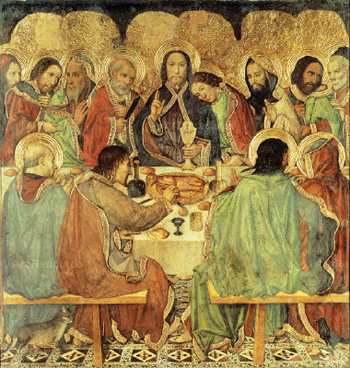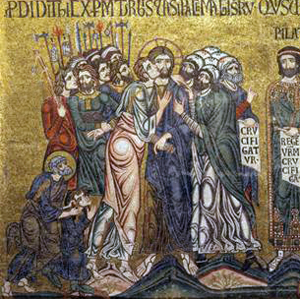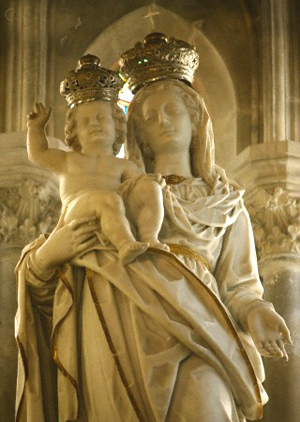 |
Special Devotions
Comments on a Meditation of St. Ignatius - IV
Our Lord’s Affection in Giving Us the Eucharist
Plinio Corrêa de Oliveira
At the beginning of St. Ignatius’ meditation on the Holy Eucharist, he sets out the three points to consider regarding a gift: 1. The grandeur of the gift itself; 2. The affection of the one who gives it; 3. Its usefulness for the recipient. Here, he addresses the affection of the one who gives the gift:
"Consider the affection of Jesus Christ in giving you this supreme good. His love was so great that, upon giving us the Holy Eucharist, it reached its final limits. Just as the flames that leap from a furnace permits us to know its heat, so we can measure the love of Christ in instituting this Sacrament by the time and way He did it, and the difficulties He overcame to do so.”
What St. Ignatius says is that to understand the affection of Our Lord in giving this gift, it is necessary to consider first His love – affection is identical to love – in giving it to us. To evaluate that love, St. Ignatius tells us to analyze the time and way Our Lord instituted it and the difficulties He experienced.
The time of the institution of the Eucharist
Regarding the time, he says: "Our Lord instituted this Sacrament at a time when men were preparing to give to Him the cruelest death possible. Further, He conceived this way to always be with us at a time when His enemies were plotting to take Him from this world.”

Our Lord instituted the Blessed Sacrament on Holy Thursday before His Passion began |
This reflection could not be more moving. You know that the Blessed Sacrament was instituted on Holy Thursday just a few hours before His Passion would begin.
To stress his point St. Ignatius goes on to cite the passage from the Epistle of St. Paul to the Corinthians that says : “On the same night that he was betrayed, Our Lord took bread.” That is to say, at the same time the Jews were planning the betrayal against Him, plotting to kill Him and take Him from this Earth, He was instituting a way to remain with men forever, without interruption.
This is very beautiful. After the Eucharist was instituted, Our Lord never left this Earth for one instant. According to Anne Catherine Emmerick, a text that can be piously believed, immediately after the Blessed Sacrament was instituted, the first person who received it was Our Lady. She says that immediately after the Consecration, the Angels took the Holy Eucharist to Our Lady and she communicated, even before the Apostles. In Our Lady the Holy Eucharist remained intact; the species did not disappear as normally happens with us. She was a permanent tabernacle until the moment of her death.
Thus, at the moment when the Jews thought they were going to cast Our Lord from Earth, when they made a trap to expel Him forever, He counter-attacked. He made a most holy trap for the Jews and remained on Earth by instituting the Eucharist. He was truly living in the Eucharist just as he was living in Our Lady during the period of gestation. He never abandoned the Earth for a moment.
With this, you see the affection of Our Lord for mankind, the marvel that He engendered in order to be with men always. We see how he remained in Our Lady as in a tabernacle, and in the places where the Apostles began to say Masses; from there His Eucharistic presence increased.
The institution of the Eucharist shows Our Lord’s supreme intelligence and His great love for us, His great will to be with us. He gave us the supreme Gift. It is a true marvel.
The way He chose
Then St. Ignatius speaks of the way in which Our Lord instituted the Blessed Sacrament: "It is under the species of a food that Our Lord chose to give himself to us in order to unite himself to us in this particular way, for just as a foodstuff that has been assimilated by our whole body cannot be separated from our substance, so also there is neither art nor force that can separate us from Christ Himself.”
This is a very beautiful reasoning. Our Lord wanted to be with us as a form of nourishment. Consider a man who eats some common bread. That bread is incorporated into the human body; it becomes a part of the man. No one can separate it from the body anymore.
St. Ignatius tells us that this is the way Our Lord unites with us in the Holy Eucharist. Our Lord no longer is separate from us; He is linked to us, He becomes a part of us, we, so to speak, “digest Him.” This was what He desired. Using this way, he established a highly intimate union with us.
The difficulties He had to overcome
Then St. Ignatius says: “But, above all, He shows His charity in the difficulties He had to overcome to do us such a great good. Even thought He could foresee the many responses of disrespect and despisal and the multitude of sacrileges of the unfaithful made against His Holy Body, as well as the many lukewarm and unworthy Christians who would receive Him, He nonetheless exposed himself to all this in order to be united with your soul.

Our Lord betrayed by Judas |
“To this forbearance, he added the most vehement desires. At the Last Supper He said Desiderium magno desideravi – I greatly desired to have this supper with you. Although He made the just people of the Old Testament greatly desire and await for many centuries His coming to the world to become incarnate, now it is He who greatly desires to come into your heart and it is He who invites you - with a desire proportionate only to His Divine Heart.”
It is another thought as brilliant as the sun. To understand the thinking, you must place yourself in the mind of Our Lord before instituting the Holy Eucharist.
Our Lord knew the past, present and future. As an obstacle to institute the Eucharist, He had the foreknowledge of all the sacrileges that would be committed until the end of the world against the Blessed Sacrament. But even all of these sacrileges were not enough to keep Our Lord from instituting the Eucharist.
“O Catholic! An infinite number of injuries, tepidities and apathies are the difficulties He chose to conquer to give you the Blessed Sacrament!” This is what St. Ignatius means. It is a thought of stupendous beauty!
Were we to receive for love of Our Lord all that He received for us or even a small fraction of the outrages He received, we would faint and lose the courage. He accepted all that so that we could have the Blessed Sacrament. This is how we can evaluate the immense charity and goodness He had for us. What an impressive meditation by St. Ignatius!
Confidence & appeal to Our Lady
I insist on the confidence and respect we should have at the hour of Communion. How grand and powerful is the God who is capable of making such a marvel, but above all how good He is! We should think of Him entering our soul with an affection corresponding to His grandness.

Go with confidence to Our Lady |
We should not image Our Lord entering our soul and making a severe, arid and boring inspection: “Look at this defect, here is this and that shortcoming that must be added into the balance. This kind of person should not have received Me!”
No, we should imagine the contrary. He enters our soul as He entered into the house of the sick persons He cured. He did not enter holding his nose because of the bad stench of the wounds. He went with affection, with the will to cure. He entered with a serene countenance, an air of goodness, disposed to listen to them and to cure them. We should have in our minds this picture of Our Lord overflowing with goodness.
Finally, we should always rely on the mediation of Our Lady. We should go to her and ask her to help us apply these considerations, saying: ”My Mother, this meditation of St. Ignatius is too immense for me to fully comprehend. But when you received Communion, you understood it. I beg you to adore God on my behalf, because I am not sufficiently grand to adore Him. Come into my soul and welcome Our Lord as you welcomed Him on Earth, because I am not capable of welcoming Him properly."
Let us do this with confidence. Then receive Our Lord with joy. Our Lady is welcoming Him for me; He is being splendidly received in my soul; I am offering Him a royal feast.
Continued

Taken from the personal records of Atila S. Guimarães,
Summarized and translated for TIA’s site
Posted August 10, 2011

Related Topics of Interest
 The Magnitude of the Gift of the Holy Eucharist The Magnitude of the Gift of the Holy Eucharist
 Our Debt of Gratitude to the Eucharist Our Debt of Gratitude to the Eucharist
 ‘Be Confounded by Your Ingratitude’ ‘Be Confounded by Your Ingratitude’
 Eucharistic Desecration in Costa Rica Eucharistic Desecration in Costa Rica
 Eucharistic Scandal in Italy Eucharistic Scandal in Italy
 Mother Teresa, a Eucharistic Minister Mother Teresa, a Eucharistic Minister
 Desecration of the Holy Eucharist by Adopting Large Hosts Desecration of the Holy Eucharist by Adopting Large Hosts
 The Burning of the Ursuline Convent in Charlestown The Burning of the Ursuline Convent in Charlestown

Related Works of Interest
|
|
Special Devotions | Religious | Home | Books | CDs | Search | Contact Us | Donate

© 2002- Tradition in Action, Inc. All Rights Reserved
|
 |
|